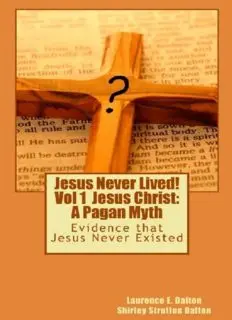
Jesus Never Lived!: Volume 1 Jesus Christ: A Pagan Myth PDF
Preview Jesus Never Lived!: Volume 1 Jesus Christ: A Pagan Myth
JESUS NEVER LIVED! VOLUME 1 JESUS CHRIST: A PAGAN MYTH JESUS NEVER LIVED! VOLUME 1 JESUS CHRIST: A PAGAN MYTH 3RD REVISED AND EXPANDED EDITION Laurence E. Dalton Shirley Strutton Dalton Jesus Never Lived! Volume 1 Jesus Christ: A Pagan Myth 3rd Revised and Expanded Edition Jesus Never Lived! Volume 1 Jesus Christ: A Pagan Myth 3rd Revised and Expanded Edition Copyright © April 2013 Laurence E. Dalton and Shirley Strutton Dalton ISBN-13: 978-1484025666 ISBN-10: 1484025660 www.jesusneverlived.com Under Creative Commons public license Attribution-NoDerivatives 4.0 International the copyright holders hereby grant a license to copy and redistribute the within material in any medium or format for any purpose, even commercially. This license cannot be revoked as long as licensee follows the license terms. You must give appropriate credit and provide a link to the license. No derivatives or adaptations are allowed. You may not remix, transform, or build upon the material; you may not distribute modified material. You may not apply legal terms or technological measures that legally restrict others from doing anything the license permits. This license does not reduce or restrict exceptions and limitations to copyright, such as fair use quotation, provided credit is given. Previously published as: Jesus Christ: A Pagan Myth, Evidence that Jesus Never Existed Revised Edition Copyright © October 2008 Jesus: Pagan Christ or Jewish Messiah? Copyright © 2000 Laurence E. Dalton and Shirley Strutton Dalton In Memory, Fay Marie For everything there is a season, And a time for every matter under heaven: A time to be born, and a time to die . . . a time to weep, and a time to laugh; a time to mourn, and a time to dance . . . Ecclesiastes 3:1-2, 4 A NOTE ON TERMINOLOGY In this book, what Christians call the Old Testament (OT), we will call the Jewish Scriptures (hereafter JS); the New Testament will be called the Christian Scriptures (hereafter CS). No one knows who wrote the four gospels, but we will for convenience accept Mark (Mk), Matthew (Mt), Luke (Lk), and John (Jn) as the authors of the canonical gospels. Mk 1.2 will signify Mark Chapter 1, verse 2. We will use BCE (Before the Common Era) instead of BC and CE (Common Era) instead of AD. “Gentile” (Greek ethnos or nation) is used in the Christian Scriptures to refer to a non-Jew, that is someone not born of a Jewish mother, or one who has not been converted to Judaism.” We will replace the word gentile with the word pagan, meaning only a person who is neither a Jew nor a Christian. Most modern commentators on the Christian Scriptures use the phrase Jewish Christian, though it appears nowhere in the CS. It is as if Jews are still considered a biological race, a concept long ago discredited. Is a Christian who converts to Judaism called a Christian Jew? A Jew who has converted to Christianity, we will designate a Christian of Jewish background. Although some ancient Jews interpreted the Jewish Scriptures symbolically, they nonetheless preserved the A NOTE ON TERMINOLOGY literal sense of the text where needed. For example, Philo of Alexandria was a Hellenized Jew, i.e., a person who was familiar with Greco-Roman culture. This Biblical commentator held that abstaining from pork reminded people not to be enslaved to greed, but he also took the command literally, believing that Jews should observe the law forbidding the eating of pork. Ancient Christians interpreted the Jewish Scriptures symbolically, often to the exclusion of the literal meaning. For example, in Exodus Moses parts the Red Sea so that the Jewish people may escape slavery in Egypt. Many Christians interpreted this passage as predicting that Jesus would save people by baptizing them with water. Lastly, it should be noted that the Jewish Scriptures were completed nearly 200 years before the time of Jesus, and all modern commentators, other than literalists, recognize that these scriptures never refer to Jesus' baptism or any other aspect of Christianity. CONTENTS A Note on Terminology .............................................................................................. 7 Part 1 Commentary on Mark ................................................................................. 11 Chapter 1 Birth, Baptism and Ministry: Mark 1.1-45 .................................. 13 Chapter 2 Condemning Jewish Law: Mark 2.1-3.35 ..................................... 39 Chapter 3 Blinding the Jews: Mark 4.1-41 ....................................................... 55 Chapter 4 Faithful Pagans: Mark 5.1-7.37 ........................................................ 69 Chapter 5 The Messiah and the Son Of Man .................................................... 93 Chapter 6 Jerusalem: Mark 11.1-33; 12.13-44; 13. ................................... 113 Chapter 7 Arrest, Trial And Crucifixion ......................................................... 131 Chapter 8 Resurrection ......................................................................................... 163 Part 2 Who Created Jesus? ......................................................................... 173 Chapter 9 Paul and the Mysteries ..................................................................... 175 Chapter 10 The Gospel of Mark. Who Created Jesus? Part 1 ................. 231 Chapter 11 The Gospel of Mark. Who created Jesus? Part 2 ................. 287 Chapter 12 Did Jesus Ever Live? by Joseph McCabe. Rebuttal by the Daltons. ........................................................................................................................ 335 Appendix A Early Jewish and pagan references to Christians. ............. 373 Appendix B Persecution by Christians ........................................................... 385 Bibliography .............................................................................................................. 391
